Friday December 14, 2018
By: Alexandra Kinias

A reporter once asked me, if I could have dinner with one Egyptian woman, dead or alive, who would it be? My instant response was Doria Shafik.
Doria died when I was 11-years-old. She ended her life by ‘plunging to her death’ out of her balcony at the age of 67. I never heard of her before her death, and I am ashamed to admit, I didn’t learn about her accomplishments until decades later.
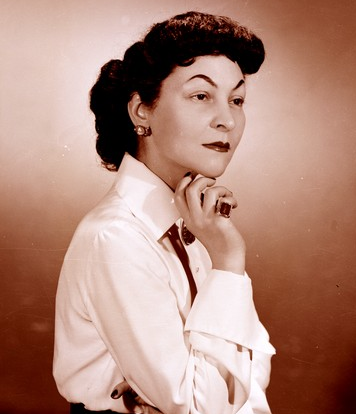 Doria was not an ordinary woman. She was a feminist, a poet, a philosopher, an editor, founder of Bint El Nil (Daughter of the Nile) magazine and Union, which became the first and only women party in Egypt. A protégé and successor of Hoda Sharawy, the leader of the Egyptian suffragette movement, Doria’s activism led to major changes for Egyptian women. Her life journey was challenging and inspiring, even by today’s standards – in spite of its dramatic ending.
Doria was not an ordinary woman. She was a feminist, a poet, a philosopher, an editor, founder of Bint El Nil (Daughter of the Nile) magazine and Union, which became the first and only women party in Egypt. A protégé and successor of Hoda Sharawy, the leader of the Egyptian suffragette movement, Doria’s activism led to major changes for Egyptian women. Her life journey was challenging and inspiring, even by today’s standards – in spite of its dramatic ending.
Among the many amazing suffragettes who played substantial roles in leading and influencing the Egyptian feminist movement at the first half of the twentieth century, Doreya’s name stands out. Not only she was the one who culminated their efforts, but who also took the fight for women rights beyond the social and educational levels to the political arena. Her efforts propelled the advancement of women political rights. Because of the pivotal activism, they gained the right to vote and have representation in the parliament. It was politics that galvanized her movement, gained her fame, made her an icon – but it was also politics that burned her at the end.
I often wonder what women status in Egypt would have been today had her advocacy and career not been interrupted by her house arrest.
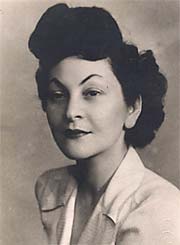 Born on December 14, 1908, to a middle-class family in Tanta, Doria attended the Notre Dame des Apôtres School for her primary education. After her mother’s death, she moved to live in Alexandria with her father. At 16, she became the youngest student to receive the French Baccalaureate and ranked 2nd place on the national level.
Born on December 14, 1908, to a middle-class family in Tanta, Doria attended the Notre Dame des Apôtres School for her primary education. After her mother’s death, she moved to live in Alexandria with her father. At 16, she became the youngest student to receive the French Baccalaureate and ranked 2nd place on the national level.
Doria, not your typical Egyptian girl in the 1920’s, who would have been content to marry and start a family – she sought Hoda Sha’arawi’s assistance to pursue her studies at the Sorbonne in Paris. Sha’rawi, who later became Doria’s mentor, arranged with the Egyptian Ministry of Education for the financial assistance Doreya needed for her scholarship.
In 1928, at the age of 16, Doria moved to Paris. She completed her Licence libre and Licence d’état in 1932, a major achievement for the young Egyptian woman. The 4 years she spent in the French capital were transformational in influencing and developing her already progressive mind. They changed her perception on women’s role in society and planted the seeds for the ideas that formed the journey she later led.
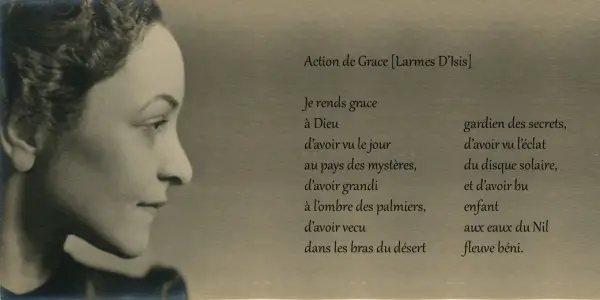
Doria had to return to Egypt to apply for a new scholarship for her PhD. Back in Egypt, she worked as a teacher at the girl’s Lyceé. She felt alienated and constrained with the social pressures in general, especially the pressures put on her to marry. In the 3 years following her return from France, two major events took place in Doria’s life. In 1935, she participated in Miss Egypt Beauty Pageant and was runner up. Her participation created controversy among her social circle. It was uncommon for a young woman of her stature to compete is such events. A rebel she was, Doria defended her action by saying, “In Paris I had asserted myself in the intellectual sphere. Now I wanted to assert myself in the feminine sphere.
After a short-lived marriage to journalist Ahmed al-Sawi, Doria returned to Paris in 1936 with a new scholarship, to obtain her PhD in philosophy. There, she met her cousin Nour al-Din Ragai, who was studying for his PhD in commercial law. They married in Paris. Together they had 2 daughters and were divorced in 1968.

With a PhD from the Sorbonne in philosophy, Doria was denied a job, in 1939, to teach at the University of Cairo under the pretext that, “her beauty and modern style were not suited for the instruction of young men.” Instead, she worked for the Ministry of Education as a French language inspector in secondary schools throughout Egypt. She also took a job as an editor-in chief of the French language magazine La Femme Nouvelle, founded by Princess Chevikar, King Fouad’s first wife.
Advocating to the affluent and the elites was not Doria’s main objective. She wanted to reach and educate the main stream Egyptian women about their rights and to guide them towards new political changes. To accomplish that, she realized she had to address them in Arabic. She launched her Arabic magazine, Bint Al Nil, which she followed by founding Bint Al Nil Union. The Union, which also strived to offer women jobs and eradicate illiteracy, became the first and only women political party after the 1952 Nasser’s military coup.
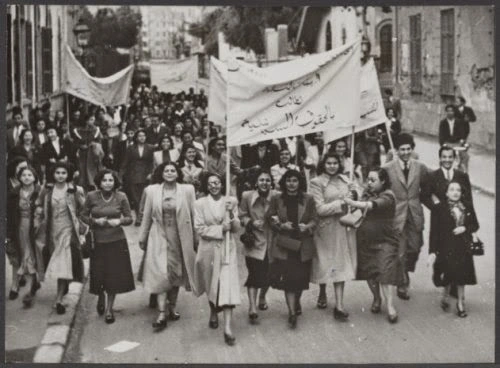
Doria created the first female military unit of Egypt, which consisted of 200 trained women. She became known as the militant activist. In 1951, she galvanized and led a demonstration of 1500 women. They marched down the streets of Cairo and stormed the gates of the parliament while in session, calling for the rights of women to vote and participate in the political life. They also demanded social reforms for women that included equal pay for equal work, limitations on polygamy and divorce – a request criticized and denounced by the religious institution. Nonetheless, she became a national celebrity.
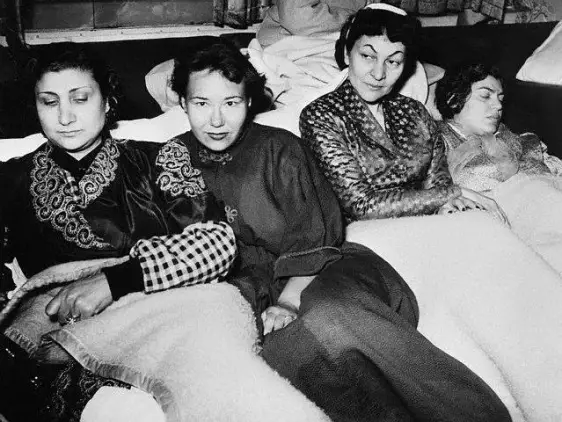
In 1954, Doria staged a hunger strike at the syndicate of journalists, alone at first. Later, she was joined by 14 of her colleagues. The hunger strike lasted for 10 days to protest the absence of women in the constituent committee formed to draft the new constitution. The hunger strike caught the attention of national and international media. The women ended the strike after President Mohamed Naguib promised to ensure women political rights. In 1956, Egyptian women were granted the right to vote for the first time.
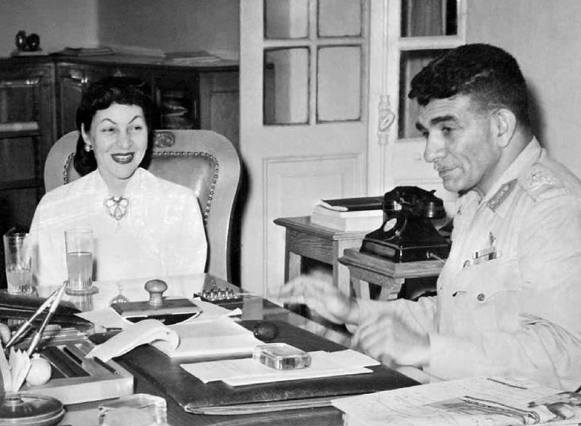
The hunger strike brought Doria international fame. She was invited to speak at women conferences and events worldwide. In 1954, news agencies named her as one of the most important women in the world. On the other hand, Egyptian authorities became less tolerant with her activism. She had crossed the line and was widely attacked in local newspapers and magazines.

When Nasser’s regime began tightening its grip on publications, Doria fought head on with Nasser, in spite of the increasing criticism she widely received in the press. In a miscalculated decision, Doria staged a second hunger strike in 1957 at the Indian embassy. This time, she swam against the current alone. In a letter addressed to the UN, she demanded the Egyptian authorities to put an end to the dictatorial rule. On Nehru’s personal intervention, Doria was allowed to leave the embassy without being arrested, but was put under house arrest. She lived for the next 18 years in seclusion.
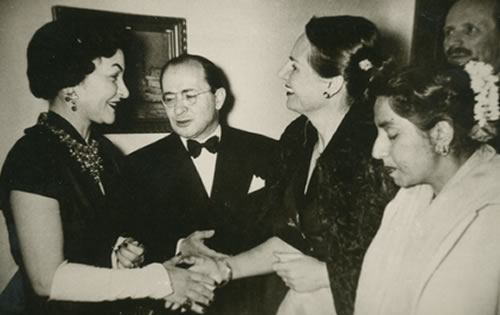
Embarrassing Nasser in front of the world was an unforgivable mistake she paid dearly for. She lost her freedom. Her office was seized and her private documents destroyed. Her magazine was banned, her publications were confiscated, her party dissolved, and her name ‘expunged’ from the Egyptian press and textbooks. And it goes without saying, she was not allowed to write. Doria was left to fade out of history.

What was worse than locking her up was to erase her from life, while she was still alive. The consequences of her house arrest not only affected her, but women in general. With her disappearance from the scene, women movement came to a halt. It’s a shame how the torch she carried was left to burn out.
Even though her name was intentionally wiped out from history books, women in Egypt, without knowing her tragic story, are enjoying their political rights because of her remarkable achievements.
If I had the chance to dine with her, I would like to know her opinion of women status in Egypt today, and what advice she would give them.
***If you liked this article, subscribe to the magazine and receive our articles in your email.
References and Photos courtesy of:
http://weekly.ahram.org.eg/Archive/2001/523/sc3.htm
http://doria-shafik.com/doria-shafik-egyptian-activist-feminism-egypt.html
http://www.encyclopedia.com/women/encyclopedias-almanacs-transcripts-and-maps/shafik-doria-1908-1975
